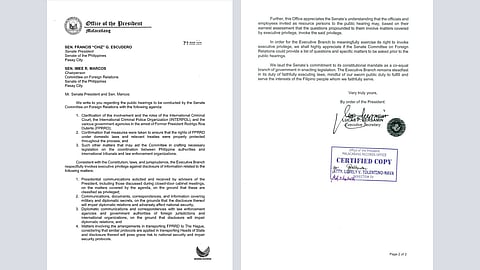
- NEWS
- the EDIT
- COMMENTARY
- BUSINESS
- LIFE
- SHOW
- ACTION
- GLOBAL GOALS
- SNAPS
- DYARYO TIRADA
- MORE

Malacañang invoked executive privilege to prevent the disclosure of information related to the arrest of former President Rodrigo Duterte during the Senate Committee on Foreign Relations hearing on 20 March.
In a letter obtained by DAILY TRIBUNE, Executive Secretary Lucas Bersamin told Senate President Francis “Chiz” Escudero and committee chair Senator Imee Marcos that certain details of the former president’s arrest were executive privilege.
The letter starkly contrasted with the statement on Friday, 21 March, of Palace Press Officer Claire Castro who said Malacañang welcomed the Senate probe as an opportunity to fully explain the legality of Duterte’s 11 March arrest and extradition to The Hague, the Netherlands, to face crimes against humanity charges before the International Criminal Court (ICC).
“People will be more enlightened as to what happened, and the law will be explained to everyone,” Castro had said in a press briefing.
But Bersamin’s letter dated 20 March — the same day as the Senate committee hearing — appeared to be tone-deaf to the public demand for full transparency regarding Duterte’s arrest.
Bersamin’s letter read in part: “Consistent with the Constitution, laws, and jurisprudence, the Executive Branch respectfully invokes executive privilege against disclosure of information related to the following matters: presidential communications solicited and received by advisers of the President, including those discussed during closed-door Cabinet meetings, on the matters covered by the agenda, on the grounds that these are classified as privileged; communications, documents, correspondence, and information covering military and diplomatic secrets, on the grounds that disclosure thereof will impair diplomatic relations and adversely affect national security.”
The Office of the President (OP) also invoked executive privilege over diplomatic communications and correspondence with law enforcement agencies, foreign governments, and international organizations, citing possible impairment of diplomatic relations.
The OP likewise invoked executive privilege regarding the arrangements for Duterte’s transport to The Hague, arguing that similar protocols are applied to the transportation of heads of state and that disclosure would pose grave risks to national security and security protocols.
The plane that transported Duterte to the Netherlands was found to have been the same aircraft President Ferdinand Marcos Jr. himself used on some of his trips.
The letter further reminded the Senate that officials invited as resource persons to the public hearing “may, based on their earnest assessment that the questions propounded to them involve matters covered by executive privilege, invoke the said privilege.”
Toward the end of the letter, the OP requested the Senate Committee on Foreign Relations to provide a list of the questions and specific topics in advance of the hearings “to allow the Executive Branch to meaningfully exercise its right to invoke executive privilege.”
“We laud the Senate’s commitment to its constitutional mandate as a co-equal branch of government in enacting legislation. The Executive Branch remains steadfast in its duty to faithfully execute the laws, mindful of our sworn public duty to fulfill and serve the interests of the Filipino people whom we faithfully serve,” the letter concluded.
A staff member in Senator Marcos’s office confirmed that they received the letter from Malacañang.
A Senate insider, who spoke on condition of anonymity, said the letter “sounded panicky, bordering on a gag order.”
During the hearing, the statements of government officials revealed significant inconsistencies in the justification for Duterte’s expedited turnover to the ICC.
This as Philippine Center for Transnational Crime (PCTC) Executive Director Anthony Alcantara admitted the International Criminal Police Organization (Interpol) had issued only a diffusion notice against Duterte — a lower-level alert used for information sharing — rather than a Red Notice, which is typically required for a provisional arrest.
The government earlier claimed it enforced the ICC arrest order on Duterte on the strength of a Red Notice issued by Interpol.
Interior Secretary Jonvic Remulla faced scrutiny from Senator Marcos, who played a video of him admitting that he, Defense Secretary Gilberto Teodoro, National Security Adviser Eduardo Año and President Marcos had planned Duterte’s arrest in advance, belying the claim that it was a last-minute decision.
Vice President Sara Duterte, speaking via teleconference, condemned her father’s arrest as an “extraordinary rendition,” arguing that it violated due process.
Duterte has undergone a pre-trial hearing at the ICC, with the next hearing for the reading of the charges scheduled in September. His lawyer, Nicholas Kaufman, is optimistic he will be acquitted.
At times, during questioning by Senator Marcos, officials like P/Maj. Gen. Nicolas Torre III invoked the principle of sub judice in refusing to answer, citing Duterte’s petition for habeas corpus pending before the Supreme Court.
